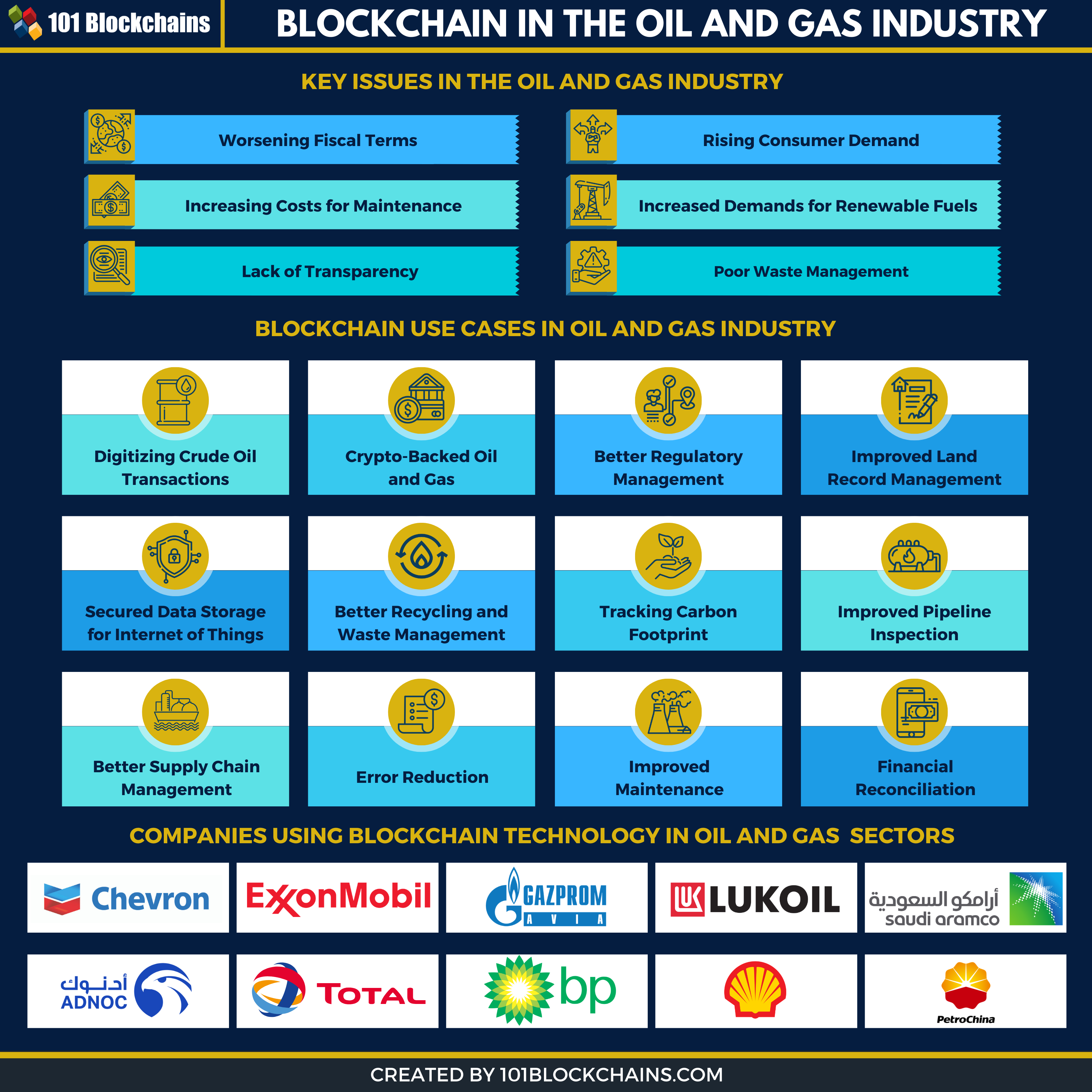Blockchain is an emerging technology in many industries, including the oil and gas industry as well. Here, we will take a closer look at how the blockchain can disrupt the oil and gas industry and make it more sustainable in the long run.
Blockchain is quickly outgrowing from the crypto tag to become an automated and smart contract facilitator. Not only this but blockchain is also regarded as the brick wall that is almost impossible to break through.
Beyond removing the middleman or intermediaries, the blockchain is now working a trusted source where it promotes utmost privacy. But what about its implications in the oil and gas industry. In reality, this industry is plagued with a multitude of issues and needs a change. But can blockchain be the savior of this industry?
Can it really be of any use here? We will dissect and help novices to understand the effects of blockchain in this niche. So, here, you can quickly learn about using blockchain in the oil and gas industry and use this knowledgebase to your advantage.
Enroll Now: Free Blockchain Course
Blockchain in Oil and Gas: Is There Any Issues?
There are lots of issues in this industry. And blockchain in the oil and gas sector can really help out in this regard. Let’s check out the possible issues of this industry right now!
Worsening Fiscal Terms
The issues are that the fiscal administrations don’t have proper stability. Therefore, the oil and gas industry faces major issues as they have to deal with changing regulations all the time. More so, every single nation comes with different types of regulations. Keeping up with all of this is practically quite challenging.
Industry leaders in this sector believe it’s only evident that this issue will overwhelm them in the long run if the fiscal administration doesn’t have stability. More so, the instability alone cost the industry more than $2.3 billion in decreased revenues. Thus, this needs a change right about now if this sector can bloom properly.
Harmful Unconventional Resources
Unconventional resources are quite hard to access. Also, previously they weren’t as much as popular as present times. By using advanced technology, companies can now use these resources. In reality, these mainly include shale gas, oil sands and coalbed methane. Although these resources open up new opportunities for this industry, the implications of using them may cause more harm in the long run.
Many experts are quite concerned about the hydraulic fracturing to get access to these resources. It can poison water resources or even cause the environment to be more unstable. So, it’s also a massive issue that you can’t overlook at the moment.
Rising Consumer Demand
The consumer demands are increasing at a rapid rate. Although many companies are already making investments to increase their growth, it’s still not enough to maintain a steady streamline of oil and gas to satisfy all demands.
Also, we have to address the fact that these resources are not unlimited. More so, the process of accessing and refining them is also very costly. Therefore, businesses in this regard have a hard time to satisfy the demand at all times.
Also, the pricing for these can drop at a rapid rate in case of an environmental disaster or even increase when the demand is high, but the supply is low.
Social and Environmental Responsibility
This is a major issue at the moment. Here, the companies have to deal with various social issues, such as stakeholders, safety concerns, and employee health issues. Also, the overall community relations can take a toll as well. More so, the oil and gas industry has to deal with corruption, and environmental damage as the process of extracting these resources are harmful to the earth itself.
Another major problem is the environmental impact of fracking. In reality, fracking is deemed illegal in many nations as it can poison the surrounding lands along with their water source. So, the people living in these lands will face major problems. In the long run, these lands become deserted and unlivable, which is a major concern as well.
Also Read: Blockchain Technology Explained: A Decentralized Ecosystem
Increased Demands for Renewable Fuels
This issue is occurring due to environmental pressure. In reality, many consumers are concerned about the implication on the environment, and they are demanding a better renewable solution to this problem. Also, the increasing amount of pollution needs to be stopped. However, companies are finding it hard to offer a fully renewable solution.
This is where they will need additional help in finding and coordinating their whole business scheme without a proper solution in this niche. If they do not address this issue immediately, they may face major problems in the long run.
Increasing Costs for Maintenance
Maintaining these plants are also another issue in this sector. In reality, all of the plants to get regular checks on how the plants are operating. More so, the industry also needs to focus on the advancement of environmentally friendly utilities. So, to make sure they are working perfectly, they need to do regular checkups.
But all of these processes do increase the costing for maintenance. As a result, the overall efficiency of the company takes a hit and decreases. Therefore, it’s really important to balance these both terms and ensure better maintenance with reduced costing.
Decreasing Performance
As the life matures of a plantation site, the overall performance of that plant decreases. However, going for a fully new plantation is a very costly process. Therefore, it’s now a requirement to maintain efficiency even if the plantation ages with time. So, the oil and gas industry need to guarantee that these plants are dependable will keep up with the demands.
As of today, there aren’t any solid solution to this problem. That’s why it’s also becoming a huge problem for both the investors and the company itself.
Read More: Blockchain in Agriculture: Use Cases and Examples
Inefficient Supply Chain
Another huge problem in this sector is the lack of proper supply chain management. In reality, every single oil or gas plants are huge in size and needs a lot of human resources to coordinate between all of the instances or elements.
But maintaining or keeping a link between these elements is a complex and challenging task. Without proper supply chain management in place, there is no way they can deal with all the elements at once. More so, there’s also no option to track the process in real-time. The technology they are using at the moment is not up to the mark and runs on the legacy system, which is prone to errors.
Lack of Transparency
Another huge problem is the lack of transparency in this industry. One of the main issues is the rising corruption that plagues the industry from inside. In reality, there are too many people misusing their position and taking benefits from companies without anyone even noticing. This is a huge burden the industry has to deal with, and it’s not capable of stopping all the corruption.
Furthermore, there is no transparency at every stage of the company. So, this is the perfect opportunity for the bad player to alter documentation easily. Thus, this issue needs external help to fully get rid of corruption for once and for all.
Lack of Proper Audits and Maintenance
Oil and gas industry don’t have proper maintenance and auditing schemes in place. Therefore, it’s only natural to face technical difficulties all the time. Due to these difficulties, the industry losses a great deal of revenue every year. Not to mention the increasing number of risks in the plantation itself. Just imagine if technical damage to the pipeline happens, and it’s not fixed immediately, it can burst at any moment.
Without a daily auditing process and quick maintenance to these issues, the situation will only get worse. But the process of auditing and coordinating these maintenances is also a costly process, and the companies are somewhat reluctant to do them at times.
Poor Waste Management
The horror of waste management in this industry is alarming. Most of the big companies don’t have a proper waste management protocols in place. However, all of these companies produce a hefty amount of waste that needs to be maintained properly. In reality, these wastes are dangerously harmful to the environment and the people.
But you will see that some companies can dump their waste anywhere they want, causing harder to the environment. In reality, governments have strict regulations to present a bad outcome, but only a handful follow the safety protocol.
Enroll Now: Certified Enterprise Blockchain Professional (CEBP) Course
Benefits of Using Blockchain In Oil and Gas Industry
There are certain benefits that come along with using blockchain in this industry. In reality, blockchain offers some very great features that can actually help this industry to shine more. For example, you can use smart contracts for automating oil and gas purchases.
More so, you can also use this to facilitate any contracts the company deal with. This will not only save time, but it will also be cost-effective.
Another major feature is transparency. Yes, blockchain offers a full transparency ledger system that is open for everyone to see.
Therefore, it’s a great opportunity to finally get back at the corruption that is destroying this industry from inside out. When the logs are open for everyone to see, you can detect any discrepancies at any time.
However, the most important part is the fact that it won’t need any detection at all as all the records of this ledger are immutable. What does that mean? Well, it means that no one can alter or delete it ever again when a record is on the ledger. So, there is no way for a bad player to alter documentations anymore.
Last but not least, blockchain can make this industry distributed and decentralized. What does that mean? Well, it means this industry will not have a central authority to govern anymore.
In reality, it will promote fairness ad trust between parties who are going to work a business together. That’s why this is one of the blockchain oil and gas use cases.
Blockchain comes with a lot of benefits for various industries. Check out our guide on the benefits of blockchain technology to learn more about it.
Blockchain Use Cases in Oil and Gas Industry
There are so many use cases of blockchain in this industry. However, we will focus on some of the crucial one’s today. Let’s check out what these are right now.
Digitizing Crude Oil Transactions
One of the most prominent blockchain oil and gas use cases is the digitization process of crude oil transactions. In reality, crude oil is an economically mature commodity market at the moment. However, only a small number of companies tend to produce crude oil for trading. More so, these happened in remote locations that need transportation. Almost 80% of the world’s crude oil transactions happen via the waterway.
With blockchain, this process can finally get the transaction it needs. For example, with blockchain, this transaction will get more security and efficiency. Also, as transparency will improve, you can easily track the process from the platform.
Crypto-Backed Oil and Gas
Blockchain can open up so many new possibilities for this industry. For starters, it can offer oil and gas backed cryptocurrency for the consumers. In reality, this can be a really big opportunity to tokenizing this sector and more options for investors. Investor markets are quite lucid at the moment, so adding more options will only benefit both industries.
More so, it can become a great source of investment and a good income source for a lot of people. Also, various parties could use this token to transfer value within them without ever needing any banks as a middleman. Therefore, it’s a really great approach to have an oil and gas backed cryptocurrency.
Better Regulatory Management
As you already know, the oil and gas industry faces major issues as they have to deal with changing regulations all the time. More so, every single nation comes with different types of regulations. Keeping up with all of this is practically quite challenging.
More so, as governments keep changing up the regulation and tax amount, the companies have a hard time figuring out how to stay within the regulations and keep the businesses going.
Therefore, using smart contracts for oil and gas industry can actually help out in this regard. Regulatory authorities can use this contract to automate the process of tax payments. Also, as the contracts always have to stay updated and maintain itself, you can keep up with any changes quite easily.
Improved Land Record Management
One of the major blockchain use cases in the oil and gas industry is improved land record management. In reality, the companies must manage all of their land records as they are the product of millions of dollars of investment.
However, the traditional or paper-based way of maintaining such a large scale of records is cumbersome. Not to mention it can fall into the wrong hand, who can then exploit it.
But with blockchain, this issue is fully manageable. As you already have access to an immutable ledger, companies can upload the information along with documentation of the land registries. So, you can fully secure the documents as no one can ever alter or delete them from the system.
Read More: Blockchain in Manufacturing: A Guide to Industrial Empowerment
Secured Data Storage for Internet of Things
Another one of the blockchain use cases in the oil and gas industry is the data storage of the IoT devices. In reality, with the evolution of technology, companies now use a lot of IoT devices to monitor their various operations.
However, the security for the data that the IoT devices collect is almost nonexistence. In general, IoT devices don’t have any decentralized structure, so they are prone to attack and very vulnerable to cyber hacks.
But if the companies start to use blockchain as the primary storage for the data, they can safeguard all of the information from the wrong hands. It can actually offer a secured layer with cryptography to encrypt all the data and make it private property.
Better Recycling and Waste Management
This is a huge opportunity for blockchain-based application to shine in this sector. As you know, most of the big companies don’t have a proper waste management protocols in place. However, all of these companies produce a hefty amount of waste that needs to be maintained properly.
In reality, these wastes are dangerously harmful to the environment and the people. On the other hand, most of the companies tend to order raw materials in a bulk amount and not reuse these products when they can.
This also increases a lot of waste. But with blockchain in the mix, companies can quickly get rid of the problem. In reality, blockchain can offer a way of tracking these products and the waste that’s produced in the plantations.
Tracking Carbon Footprint
Another popular use of blockchain in the oil and gas sector is the tracking of carbon emission. In the long run, all the plantation of this industry produces a lot of pollution and emits a lot of carbon into the environment. Therefore, it’s only practical to introduce a more sustainable business model that will reduce the carbon footprints once and for all.
This is where blockchain comes into play. In reality, blockchain can single-handedly track all the carbon emissions and offer better management systems for this industry. So, using this tech, the industry can finally track down and reduce carbon footprints.
Improved Pipeline Inspection
In reality, pipeline inspection will need a good amount of coordination from regional companies to finish the work efficiently. As in many cases, the companies have to show the inspection information or get a certification based on the data to keep the business running.
However, coordination between regional companies is not an easy task. In many cases, they fail to coordination and sometimes even forge the data to get the certification.
To stop this, blockchain can introduce its platform to manage the pile inspections. More so, the inspection companies can upload the data from verification on the channel, and it will also happen in real-time. Any kind of company can see the inspection data in real-time.
Want to check out more blockchain use cases? Check out the top 20+ blockchain use cases right now!
Better Supply Chain Management
As you already know, every single oil or gas plant is huge in size and needs many human resources to coordinate between all of the instances or elements.
But maintaining or keeping a link between these elements is a complex and challenging task. Without proper supply chain management in place, there is no way they can deal with all the elements at once.
Therefore, using blockchain in the oil and gas sector can help to improve supply chain management. In reality, blockchain can help to monitor the system 24/7/365. So, any issues or any problems are easily trackable through the platform.
Error Reduction
Another major problem with human resources is the number of errors they make during data collection. Well, this is something even the training can’t get rid of. In reality, humans are prone to making an error, and even a single error in this regard can result in massive losses. However, as there is no way for this industry to get rid of all the human resources, it needs more technological help as it can get.
So, using blockchain here will surely help them reduce the human-made errors once and for all. In many cases, the companies can automate the data collection of maintenance data, field tickets and so on. This will significantly reduce the chance of errors.
Improved Maintenance
In reality, maintenance within the plantation is a heavy cost task. But all of these processes do increase the costing for maintenance. As a result, the overall efficiency of the company takes a hit and decreases.
Therefore, it’s really important to balance both terms and ensure better maintenance with reduced costing.
Therefore, using blockchain in oil and gas in this industry can actually help to improve the maintenance process. It will be regular, and the safety will maintain throughout all processes.
In reality, these databases are easy to automate, and maintenance of these databases are low. So, in short, it will save money and offer a better outcome in the long run.
Financial Reconciliation
The upstream process of the industry is quite complex. Therefore, many companies can end up working on the same project at the same time. Thus, keeping all of these in the record and maintaining them properly is a tough call as of now. That’s why many companies can clash together on what they are working on.
Therefore, using smart contracts to automate all the oil and gas industry projects can actually solve the issues. So, facilitating all the parties within a single contract will actually help out, in the long run, to amuse all the issues at once.
Blockchain can help you to boost your business. Start your blockchain project using our ultimate blockchain implementation strategy now!
Which Companies Are Implementing Blockchain Technology in Oil and Gas Industry?
Abu Dhabi National Oil Company
Abu Dhabi National Oil Company is implementing blockchain technology in the oil and gas industry to increase the transparency within the companies. More so, they are also planning to extend this tech to their supply chain management as well.
Shell
Shell is another company implementing blockchain technology in the oil and gas industry for its crude oil trading. More so, they also have Macquarie as the investment bank in the project. They are planning to invest in Sinochem project.
PetroChina
PetroChina is using blockchain in oil and gas for the downstream processes. At present, they are working on a project that will help them trade petroleum in a more efficient way. The company already raised $15 million for the project.
Saudi Aramco
Saudi Aramco is also using blockchain in the oil and gas industry for the downstream processes. At present, they are working with VAKT for trading. In reality, this platform is more suited for post-trade processing.
BP
BP is also using blockchain in the oil and gas sector. More so, they are working on a platform for energy commodity trading and the oil and gas industry falls right into it. They are also working with VAKT.
ExxonMobil
ExxonMobil is another player in the blockchain niche. At present, they are using blockchain in oil and gas for downstream processes. They recently completed a trial for blockchain-based authorization for expenditure (AFE).
Chevron Corporation
Chevron Corporation is one of the major giants of this industry. At the moment, they are also interested in using this technology for their oil trading purposes. More so, they joined a consortium with other leading players in the market.
Total SE
Total SE is using blockchain in oil and gas field for increasing efficiency of their oil trading capabilities. They expect great results from this technology and want to leverage it as much as possible.
Lukoil
Lukoil is using this technology in a different way. In reality, they are accepting Bitcoin as an official way to pay in their Gas stations. Their stations in Estonia, Lithuania, and Latvia already live in accepting this crypto.
Gazprom
Gazprom is also using blockchain in oil and gas field. In reality, they want to use this technology to monitor and execute their day-to-day business contracts. For that, they will use smart contracts to automate the process.
Check out the top 50 companies using blockchain technology to see more real-world example of blockchain-based use cases.
Ending Note: Future of Blockchain in Oil and Gas
As you can see, the future of blockchain in the oil and gas industry is quite bright. There are so many ways this technology can help out this sector. Judging from all the big player already taking the initiative in this regard we can safely assume it’s here to stay.
Although many are still skeptical about the future of blockchain in the oil and gas sector, still the real-world examples tell you otherwise.
If you are just a novice who also wants to use blockchain in this industry or want to learn more about the technology, we recommend starting with our free blockchain course. This can be the first step towards your goal!





